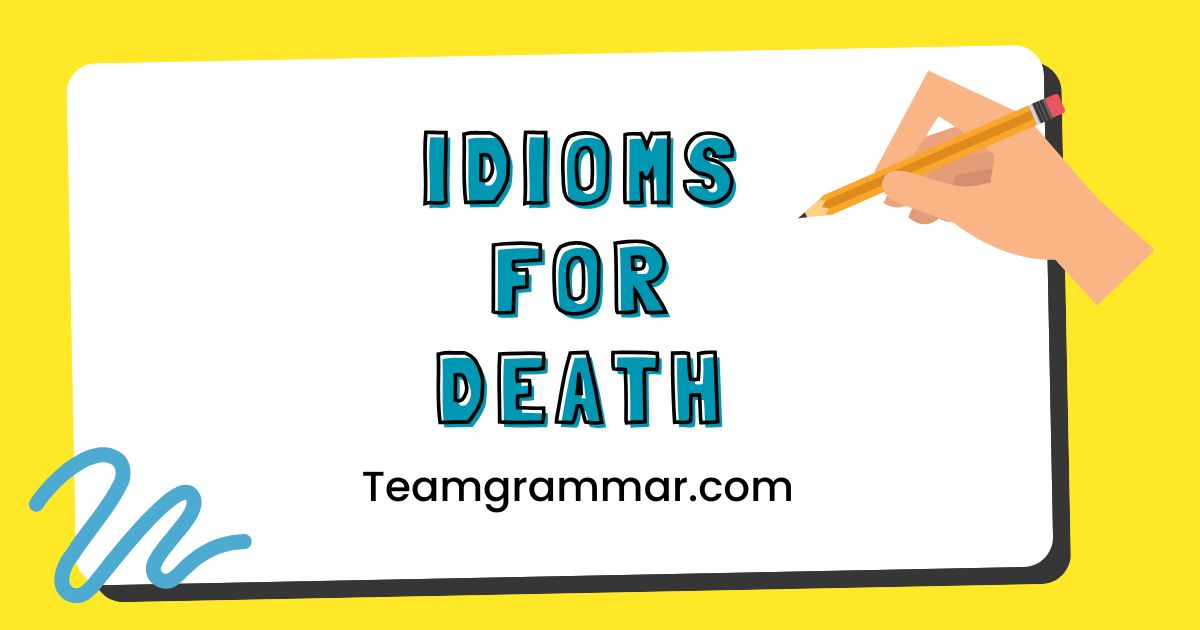27+ Idioms for Death: A Comprehensive Guide to Euphemisms
Death, a universal and inevitable part of life, is often a difficult topic to discuss directly. Consequently, English is rich with idioms and euphemisms that allow us to talk about death in a more gentle, indirect, or even humorous way.
Understanding these idioms is crucial for comprehending nuanced conversations, literature, and cultural expressions. This article provides a comprehensive guide to idioms for death, exploring their meanings, origins, and appropriate usage.
This guide is beneficial for English language learners, literature students, and anyone seeking a deeper understanding of the English language and its cultural sensitivities.
Table of Contents
- Introduction
- Definition of Idioms for Death
- Structural Breakdown of Idioms
- Types and Categories of Death Idioms
- Examples of Idioms for Death
- Usage Rules for Death Idioms
- Common Mistakes When Using Death Idioms
- Practice Exercises
- Advanced Topics: Cultural Sensitivity
- Frequently Asked Questions
- Conclusion
Definition of Idioms for Death
Idioms for death are phrases or expressions that are used to describe death or dying without directly stating it. These idioms often serve as euphemisms, softening the harsh reality of death and making the topic easier to discuss.
They can range from gentle and comforting to blunt and even humorous, depending on the context and the speaker’s intention. Understanding these idioms requires recognizing that their literal meanings differ significantly from their intended figurative meanings.
The function of these idioms is multifaceted. Primarily, they provide a way to avoid causing distress or discomfort when discussing a sensitive subject.
They can also reflect cultural attitudes towards death, ranging from reverence and respect to fear and denial. In literature and everyday conversation, idioms for death add depth and nuance, allowing speakers and writers to convey complex emotions and perspectives.
Structural Breakdown of Idioms
Idioms, by their nature, deviate from standard grammatical rules. Their meaning is not derived from the individual words but from the phrase as a whole.
The structural breakdown of idioms for death often involves metaphorical language, where death is represented by other concepts such as sleep, travel, or cessation of activity. For example, the idiom “to kick the bucket” uses the image of kicking a bucket to represent dying, even though there is no literal connection between the two.
The structure can also involve verb phrases with prepositions, such as “to pass away” or “to depart this life,” where the verbs “pass” and “depart” are used metaphorically to indicate the transition of death. These constructions often employ abstract nouns and verbs to distance the speaker from the directness of the word “death.” Recognizing these structural patterns helps in understanding and interpreting various idioms for death.
Furthermore, some idioms are based on historical or cultural contexts. For instance, “to meet one’s maker” reflects a religious belief in a creator who will judge individuals after death.
Understanding the origins of these idioms provides insight into their deeper significance and usage.
Types and Categories of Death Idioms
Idioms for death can be categorized based on their tone, context, and the specific imagery they evoke. These categories are not mutually exclusive, as some idioms may fit into multiple categories depending on the situation.
Understanding these categories helps in choosing the appropriate idiom for a given context.
Gentle Euphemisms
Gentle euphemisms are used to soften the impact of discussing death, often providing comfort or solace. These idioms typically avoid direct confrontation with the harsh reality of death and focus on the peaceful or transitional aspects.
They are often used in formal settings or when speaking to someone who is grieving.
Blunt Idioms
Blunt idioms are more direct and less concerned with softening the impact of death. These idioms can be straightforward, humorous, or even slightly insensitive.
They are often used in informal settings or when speaking to someone who is comfortable with the topic of death.
Religious Idioms
Religious idioms incorporate religious beliefs or imagery to describe death. These idioms often reflect the idea of an afterlife, divine judgment, or spiritual transition.
They are commonly used within religious communities or when discussing death from a religious perspective.
Humorous Idioms
Humorous idioms use humor to lighten the mood when discussing death. These idioms can be ironic, sarcastic, or simply lighthearted.
They are often used as a coping mechanism or to defuse tension in difficult situations. However, it’s important to use them with caution and sensitivity, as they may not be appropriate in all contexts.
Violent Idioms
Violent idioms describe death in a graphic or violent manner. These idioms are often used to emphasize the suddenness or brutality of death.
They are typically used in specific contexts, such as describing accidents, wars, or criminal acts, and should be used with caution due to their potentially disturbing nature.
Examples of Idioms for Death
The following tables provide examples of idioms for death, categorized by their tone and context. Each example is accompanied by its meaning and a sample sentence to illustrate its usage.
These examples showcase the diversity and richness of idioms for death in the English language.
Gentle Euphemism Examples
The table below showcases gentle euphemisms for death. These phrases are often used to soften the impact of discussing death and offer comfort during times of grief.
| Idiom | Meaning | Example Sentence |
|---|---|---|
| Passed away | Died | My grandmother passed away peacefully in her sleep. |
| Departed this life | Died | He departed this life surrounded by his family. |
| Gone to a better place | Died and is now in heaven | We believe she has gone to a better place. |
| At peace | Died peacefully | After a long illness, she is finally at peace. |
| No longer with us | Died | Our colleague is no longer with us. |
| Lost their battle | Died after fighting an illness | He lost his battle with cancer. |
| Slipped away | Died gently | She slipped away quietly in the early hours of the morning. |
| Entered eternal rest | Died and is now in heaven | He has entered eternal rest after a life of service. |
| Called home | Died (religious context) | She was called home to be with the Lord. |
| Expired | Died (formal, often clinical) | The patient expired at 3:00 AM. |
| Fallen asleep | Died (gentle, often used for children) | Our beloved pet has fallen asleep forever. |
| Crossed over | Died and moved to the afterlife | She has crossed over to the other side. |
| Ascended to heaven | Died and went to heaven | He ascended to heaven to be with the angels. |
| Reunited with loved ones | Died and joined deceased family | She has been reunited with her loved ones in the afterlife. |
| Gave up the ghost | Died (old-fashioned) | The old car finally gave up the ghost. |
| Kicked the bucket | Died (informal, sometimes humorous) | I heard old Mr. Henderson finally kicked the bucket. |
| Pushing up daisies | Died and buried | He’s pushing up daisies somewhere in France. |
| Checked out | Died (informal) | I heard John checked out last night. |
| Bought the farm | Died (informal) | He bought the farm during the war. |
| Met their maker | Died and met God | He has gone to meet his maker. |
| Joined the choir invisible | Died (humorous, literary) | He has joined the choir invisible of the great departed. |
| Gone to the great beyond | Died and gone to the afterlife | She has gone to the great beyond. |
| Answered the call | Died (often in military or public service) | He answered the call of duty and died a hero. |
| Succumbed to | Died from | He succumbed to his injuries after the accident. |
Blunt Idiom Examples
This table presents more direct and less delicate idioms for death. These expressions are often used in informal contexts or when the speaker wants to avoid sentimentality.
| Idiom | Meaning | Example Sentence |
|---|---|---|
| Bit the dust | Died, often in a violent or sudden way | He bit the dust in the shootout. |
| Croaked | Died (informal, often derogatory) | The old frog croaked last night. |
| Kicked off | Died (informal) | He kicked off suddenly last week. |
| Bought it | Died (informal) | He bought it in the war. |
| Met their end | Died | The villain finally met his end. |
| Cashed in their chips | Died (informal) | He cashed in his chips after a long illness. |
| Went belly up | Died (informal, often used for businesses) | The company went belly up after the scandal. |
| Took a dirt nap | Died and was buried | He’s taking a dirt nap six feet under. |
| Six feet under | Buried | He’s six feet under now. |
| In the grave | Dead and buried | He’s been in the grave for twenty years. |
| Stiffed it | Died (slang) | He stiffed it last night. |
| Checked out permanently | Died | He’s checked out permanently from this hotel. |
| Went to the farm | Died (euphemistic, often used for pets) | Our old dog finally went to the farm. |
| Lost the number | Died (informal) | He’s lost the number now. |
| Shuffle off this mortal coil | Died (literary, from Shakespeare) | He has shuffled off this mortal coil. |
| To be no more | To be dead | He will be no more. |
| Turned up their toes | Died (informal) | He finally turned up his toes. |
| Took the big sleep | Died (film noir slang) | He’s taken the big sleep. |
| Bought the farm | Died (informal, military slang) | He bought the farm in Vietnam. |
| Went to meet his/her maker | Died and met God | He went to meet his maker. |
| Went west | Died (historical, military slang) | He went west during the war. |
| Went the way of all flesh | Died (biblical) | He has gone the way of all flesh. |
| Joined the majority | Died (formal, slightly humorous) | He has joined the majority. |
| Went to the great gig in the sky | Died (rock music reference) | He’s gone to the great gig in the sky. |
Religious Idiom Examples
The following table provides examples of religious idioms for death. These expressions often reflect beliefs about the afterlife, divine judgment, or spiritual transition.
| Idiom | Meaning | Example Sentence |
|---|---|---|
| Called home | Died and returned to God | She was called home to be with the Lord. |
| Joined the angels | Died and went to heaven | He has joined the angels in heaven. |
| Went to heaven | Died and entered heaven | She went to heaven after a long and virtuous life. |
| Resting in peace (RIP) | Died and is now at peace in the afterlife | May he rest in peace. |
| With God | Died and is now in God’s presence | He is now with God. |
| In God’s hands | Died and is now under God’s care | She is now in God’s hands. |
| Ascended to heaven | Died and went to heaven | He ascended to heaven to be with the saints. |
| Met their maker | Died and met God | He has gone to meet his maker. |
| Entered eternal rest | Died and is now at peace in heaven | She has entered eternal rest after a life of service. |
| Reunited with loved ones | Died and joined deceased family in the afterlife | She has been reunited with her loved ones in heaven. |
| Received their reward | Died and received their heavenly reward | He has received his reward in heaven. |
| Taken by the Lord | Died, God took them | She was taken by the Lord. |
| In Abraham’s bosom | Died and is in a place of comfort (biblical) | May he rest in Abraham’s bosom. |
| Given their soul to God | Died and their soul returned to God | She has given her soul to God. |
| Transformed to glory | Died and transformed into a glorified state | He has been transformed to glory. |
| Inherited eternal life | Died and inherited eternal life | She has inherited eternal life. |
| Found peace in the Lord | Died and found peace in God | He has found peace in the Lord. |
| Sheltered in the arms of God | Died and is protected by God | She is sheltered in the arms of God. |
| Welcomed into God’s kingdom | Died and entered God’s kingdom | He has been welcomed into God’s kingdom. |
| Present with the Lord | Died and is in the presence of God | She is now present with the Lord. |
| Joined the heavenly host | Died and joined the angels | He has joined the heavenly host. |
| In paradise | Died and is in paradise | She is now in paradise. |
| With the saints triumphant | Died and is with the triumphant saints | He is with the saints triumphant. |
| At rest in the Lord’s arms | Died and is at rest with God | She is at rest in the Lord’s arms. |
Humorous Idiom Examples
This table includes idioms that use humor to talk about death. These expressions are often used to lighten the mood or as a coping mechanism, but should be used with caution and sensitivity.
| Idiom | Meaning | Example Sentence |
|---|---|---|
| Kicked the bucket | Died (informal, often humorous) | I heard old Mr. Henderson finally kicked the bucket. |
| Pushing up daisies | Died and buried | He’s pushing up daisies somewhere in France. |
| Checked out | Died (informal) | I heard John checked out last night. |
| Bought the farm | Died (informal) | He bought the farm during the war. |
| Joined the choir invisible | Died (humorous, literary) | He has joined the choir invisible of the great departed. |
| Met the Grim Reaper | Died (humorous personification of death) | He finally met the Grim Reaper. |
| Took a permanent vacation | Died (humorous) | He’s taken a permanent vacation. |
| Went to the big sleep | Died (humorous, film noir reference) | He’s gone to the big sleep. |
| Turned up their toes | Died (informal, humorous) | He finally turned up his toes. |
| Lost their marbles | Died (humorous, euphemistic) | He’s lost his marbles, permanently. |
| Gone to meet the worms | Died and buried (humorous) | He’s gone to meet the worms. |
| Expired (like milk) | Died (humorous, informal) | He expired, like milk past its date. |
| Checked out of the hotel of life | Died (humorous, elaborate) | He’s checked out of the hotel of life. |
| Met their Waterloo | Died (humorous, historical reference) | He finally met his Waterloo. |
| Gone to the great beyond (with no return ticket) | Died (humorous) | He’s gone to the great beyond, with no return ticket. |
| Kicked off the mortal coil | Died (humorous variation of “shuffle off this mortal coil”) | He kicked off the mortal coil. |
| Gone to the happy hunting ground | Died (humorous, Native American reference) | He’s gone to the happy hunting ground. |
| Taking a long nap | Died (humorous, euphemistic) | He’s taking a long nap, from which he won’t wake up. |
| Gone to the other side (and can’t call back) | Died (humorous) | He’s gone to the other side, and can’t call back. |
| Joined the silent majority | Died (humorous) | He’s joined the silent majority. |
| Off to the land of Nod | Died (humorous, archaic) | He’s off to the land of Nod, permanently. |
| Gone where the woodbine twineth | Died (humorous, old-fashioned) | He’s gone where the woodbine twineth. |
| Called it a day (for good) | Died (humorous) | He’s called it a day, for good. |
| Gone to sleep with the fishes | Died (humorous, mafia reference) | He’s gone to sleep with the fishes. |
Violent Idiom Examples
The table below includes idioms that describe death in a violent or graphic manner. These are often used to emphasize the suddenness or brutality of death, and should be used with caution.
| Idiom | Meaning | Example Sentence |
|---|---|---|
| Bit the dust | Died, often in a violent or sudden way | He bit the dust in the shootout. |
| Bought it | Died (informal, often in a violent context) | He bought it in the war. |
| Blew away | Killed suddenly | He was blown away by the explosion. |
| Taken out | Killed deliberately | He was taken out by a sniper. |
| Wiped out | Killed completely | The entire squad was wiped out. |
| Cut down in their prime | Died young and unexpectedly | He was cut down in his prime by a drunk driver. |
| Lost their life | Died, often in a tragic way | He lost his life trying to save the child. |
| Met a violent end | Died violently | He met a violent end in the city. |
| Done in | Killed (slang) | He was done in by his enemies. |
| Finished off | Killed completely | The assassins finished him off. |
| Snuffed out | Killed suddenly and brutally | His life was snuffed out in an instant. |
| Put down | Killed (often used for animals) | The vet had to put down our old dog. |
| Nailed to the cross | Suffered and died (religious reference) | He was metaphorically nailed to the cross by his critics. |
| Given the chop | Killed (slang) | He was given the chop by the gang. |
| Ended up in a box | Died and placed in a coffin | He ended up in a box after the accident. |
| Sent to the grave | Caused someone’s death | His lies sent her to the grave. |
| Paid the ultimate price | Died for a cause | He paid the ultimate price for his country. |
| Met their maker (prematurely) | Died young (violent context) | He met his maker prematurely due to the attack. |
| Taken before their time | Died young | She was taken before her time by the illness. |
| Gone to a better place (unexpectedly) | Died suddenly | He’s gone to a better place, much sooner than we expected. |
| Met their demise | Died, often violently | The hero finally met his demise at the hands of the villain. |
| Killed in action | Died during military combat | He was killed in action on the battlefield. |
| Fell in battle | Died during a fight | Many soldiers fell in battle. |
| Faced the firing squad | Executed by firing squad | He faced the firing squad with dignity. |
Usage Rules for Death Idioms
Using idioms for death appropriately requires sensitivity and awareness of the context. The tone, audience, and situation all play a role in determining which idiom is suitable.
Gentle euphemisms are generally appropriate in formal settings or when speaking to someone who is grieving. Blunt idioms are more suitable for informal settings or when speaking to someone who is comfortable with the topic of death.
Humorous idioms should be used with caution, as they may not be appropriate in all contexts. Violent idioms should be reserved for specific situations where the graphic nature of death needs to be emphasized.
It’s also important to consider the cultural background of your audience. Some idioms may be more common or acceptable in certain cultures than others.
Being mindful of these cultural differences can help avoid misunderstandings or offense.
Finally, pay attention to the specific connotations of each idiom. Some idioms may carry additional meanings or associations that are not immediately apparent.
Understanding these nuances can help you choose the most appropriate idiom for your intended message.
Common Mistakes When Using Death Idioms
One common mistake is using an idiom in an inappropriate context. For example, using a humorous idiom when offering condolences to someone who has just lost a loved one would be highly insensitive.
Similarly, using a violent idiom in a formal setting would be inappropriate.
Another mistake is misinterpreting the meaning of an idiom. Because idioms have figurative meanings, it’s important to understand their intended meaning before using them.
Otherwise, you may inadvertently convey a message that is different from what you intended.
A third mistake is overusing idioms. While idioms can add color and nuance to your language, using too many idioms can make your speech sound unnatural or contrived.
It’s best to use idioms sparingly and only when they enhance your message.
Here are some examples of common mistakes:
| Incorrect | Correct | Explanation |
|---|---|---|
| “I’m so sorry for your loss. He totally kicked the bucket.” | “I’m so sorry for your loss. He passed away peacefully.” | Using “kicked the bucket” is insensitive in a condolence message. |
| “The company passed away last year due to poor management.” | “The company went bankrupt last year due to poor management.” | “Passed away” is generally used for people, not businesses. |
| “He bought the farm and is now resting in peace.” | “He bought the farm.” or “He is now resting in peace.” | Mixing a blunt idiom with a gentle one can sound awkward. |
Practice Exercises
Test your understanding of idioms for death with the following exercises. Choose the most appropriate idiom to complete each sentence, considering the context and tone.
| Question | Options | Answer |
|---|---|---|
| After a long illness, she finally __________. | a) bit the dust, b) passed away, c) bought the farm | b) passed away |
| He __________ in the war, fighting for his country. | a) kicked the bucket, b) bought it, c) went to a better place | b) bought it |
| We believe she has __________ and is watching over us. | a) croaked, b) gone to a better place, c) taken a dirt nap | b) gone to a better place |
| The old car finally __________ after years of faithful service. | a) gave up the ghost, b) bit the dust, c) pushed up daisies | a) gave up the ghost |
| He __________ after a long and fulfilling life. | a) met his maker, b) shuffled off this mortal coil, c) stiffed it | a) met his maker |
| The gangster ________ after the rival gang attacked. | a) passed away, b) kicked the bucket, c) bit the dust | c) bit the dust |
| She __________ at a very young age due to a tragic accident. | a) went to heaven, b) was taken before her time, c) turned up her toes | b) was taken before her time |
| After a long illness, it was a relief that he was finally ________. | a) at peace, b) six feet under, c) pushing up daisies | a) at peace |
| The old dog __________ and now rests in the garden. | a) bought the farm, b) went to the farm, c) passed away | b) went to the farm |
| He __________ after a short illness, just a few weeks after retirement. | a) lost the number, b) checked out, c) joined the majority | b) checked out |
Answers: 1. b, 2. b, 3. b, 4. a, 5. a, 6. c, 7. b, 8. a, 9. b, 10. b
Advanced Topics: Cultural Sensitivity
Navigating the use of idioms for death requires a heightened sense of cultural sensitivity. Different cultures hold varying beliefs and attitudes towards death, which significantly influence the appropriateness of certain idioms.
For instance, some cultures may prefer direct and straightforward language, while others favor euphemisms to soften the impact of the topic. Understanding these nuances is essential to avoid causing offense or discomfort.
In some societies, discussing death openly is considered taboo, and using any idiom, regardless of its gentleness, may be inappropriate. It’s crucial to research and understand the cultural norms and preferences of the individuals or communities you are interacting with.
Additionally, religious beliefs play a significant role. Idioms with religious connotations should be used with respect and awareness of the audience’s faith or lack thereof.
Moreover, even within the same language and culture, generational differences can impact the acceptance of certain idioms. Older generations might find some modern slang terms disrespectful, while younger individuals may perceive traditional euphemisms as outdated or overly formal.
Adapting your language to suit the specific audience and context is key to effective and respectful communication.
Frequently Asked Questions
- What is the difference between an idiom and a euphemism for death?
An idiom is a phrase whose meaning is not predictable from the usual meanings of its constituent elements. A euphemism is a mild or indirect word or expression substituted for one considered to be too harsh or blunt when referring to something unpleasant or embarrassing. Many idioms for death are also
euphemisms, as they are used to soften the harsh reality of death.
- Why do we use idioms for death instead of saying “died”?
Idioms for death are used to soften the impact of discussing a sensitive topic, to show respect, or to fit the tone of a conversation. They can also reflect cultural attitudes towards death.
- Is it ever appropriate to use humorous idioms for death?
Humorous idioms for death can be appropriate in informal settings or as a coping mechanism, but they should be used with caution and sensitivity, as they may not be suitable in all contexts.
- How can I choose the right idiom for death in a conversation?
Consider the tone, audience, and situation. Gentle euphemisms are generally appropriate in formal settings or when speaking to someone who is grieving. Blunt idioms are more suitable for informal settings or when speaking to someone who is comfortable with the topic of death.
- Are there any idioms for death that should be avoided?
Avoid idioms that are offensive, insensitive, or culturally inappropriate. Be mindful of the specific connotations of each idiom and use them with respect and awareness.
- Can the meaning of death idioms change over time?
Yes, like all language, the meaning and usage of idioms can evolve over time. Some idioms may become outdated, while new ones may emerge. It’s important to stay aware of current usage and cultural context.
- What are some examples of culturally specific death idioms?
Different cultures have their own unique ways of expressing death. For example, in some cultures, it’s common to say that someone has “returned to the ancestors” or “gone to the spirit world.” These idioms reflect specific cultural beliefs about the afterlife.
- How do I explain death idioms to someone learning English?
Start by explaining the concept of idioms and how their meanings differ from the literal meanings of the words. Provide examples of common death idioms and explain their intended meanings and appropriate usage. Emphasize the importance of context and cultural sensitivity.
- What is the origin of the idiom “kick the bucket”?
The origin of “kick the bucket” is uncertain, but one theory suggests it comes from the practice of hanging animals for slaughter, where the animal would literally kick the bucket before dying. Another theory suggests it refers to a person standing on a bucket to hang themselves, kicking the bucket away as they die.
- Is it okay to use death idioms in writing, such as in a novel or poem?
Yes, using death idioms in writing can add depth and nuance to your work. Choose idioms that fit the tone, setting, and characters in your story. Be mindful of the impact on your readers and use idioms to enhance the emotional effect of your writing.
Conclusion
Idioms for death provide a rich tapestry of expressions that allow us to navigate the delicate and often difficult topic of mortality. From gentle euphemisms that offer comfort to blunt idioms that confront the reality of death, these phrases reflect diverse attitudes and cultural beliefs.
By understanding the types, usage rules, and potential pitfalls of death idioms, we can communicate with greater sensitivity and effectiveness. As language evolves, so too will the idioms we use to describe death, making it an ongoing journey of learning and cultural awareness.
Whether you are an English language learner, a literature enthusiast, or simply seeking to enhance your communication skills, mastering idioms for death is a valuable asset in navigating the complexities of human expression.







